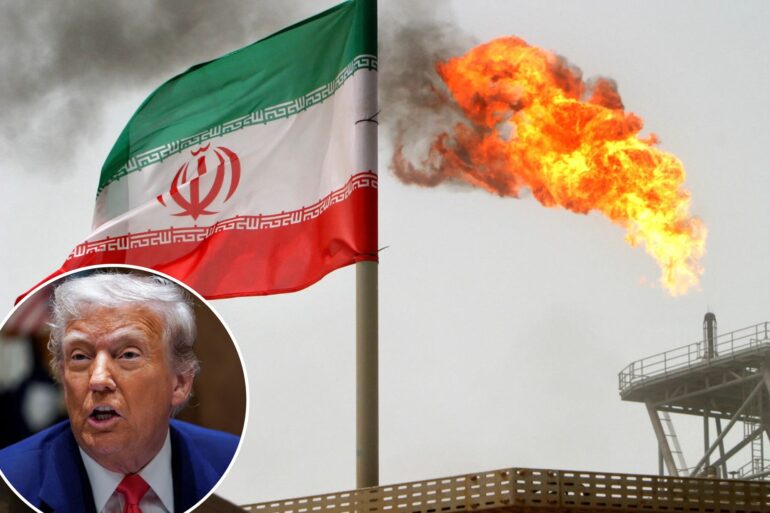🔴 Website 👉 https://u-s-news.com/
Telegram 👉 https://t.me/usnewscom_channel
In a nearly unprecedented move, the Trump administration met directly with Iran on Saturday to hold denuclearization talks. Currently, Iran is amassing enough enriched uranium to make one nuclear weapon a month.
Previous administrations would have never dreamed of direct talks with a pariah state like Iran so early in a new administration. They would have favored a slower technocratic process of preliminary proposals, proffers, and, above all else, insulating the principals from any blame in the event the talks failed.
Not Trump. He has never been much for bureaucratic foreplay. He’s bored by conventions and processes. And as we saw after the Saturday meeting, his instincts may again be right.
AP
Trump’s message to Iran is simple. You have no cards. The walls are closing in. Abandon your nuclear program, or else.
To most observers, this appears to be the use of hard power, or the threat of it, by someone with a bigger gun. Two US strike forces — two US carriers, 18 warships — and 30% of our stealth bomber fleet have moved into the region. Israel — which successfully struck Iran in 20 locations in October 2024 and took out most of Iran’s air defenses — has also been itching for another strategic strike.
But what most of the commentariat is missing is the three-dimensional strategy Trump seems to be employing on the global chess board.
The headline today is the use of hard power (aerial strikes), but the more important story may be a brilliant use of soft power complementing the threat of force that, if successful, will even further isolate Iran.
The story of this chess game starts, interestingly enough, with the armistice negotiations in Ukraine. Right now, Trump is positioned to secure a peace agreement that ensures a reshaped Ukraine’s sovereignty and security with US “economic boots” on the ground, notwithstanding Vladimir Putin’s expected gamesmanship.
If Trump pulls this off, it will allow the US and the West to lift oil sanctions on Russia and gradually reintegrate Russia into the Western economy.
But there is a critical caveat. “In exchange, Russia detaches itself from Iran,” scholar and commentator Haviv Rettig Gur says of this newly emerging strategy.
It makes abundant sense: Russia will get much more economically from a détente with the West than a continued tenuous military alliance with a dead-man-walking Iranian regime that Iran relied on primarily for its imperialist aims in Syria and Iraq.
The US could further kneecap the Iranian-Chinese segment of the “Axis of Autocrats” by sanctioning Iranian tankers that evade export sanctions and ship oil to China. Properly enforced, sanctions could stop the flow of Iranian oil to China in days.
Israel could also destroy those tankers with limited air strikes. Russia now sells roughly half of its oil to China, and reopening Western energy markets to Russia would also serve the purpose of driving a wedge between Russia and China.
On a parallel track, as Gur notes, Saudi Arabia wants a Senate-ratified security defense pact with the US, together with an Israeli economic partnership in order to advance its Vision 2030 goals of moving the Saudi economy away from oil-export dependence.
The Saudis want this security deal badly enough to promise Trump $1.4 trillion worth of investments in the next four years. The moderate Arab states surely see a better future here, and therein lies the real possibility, if not likelihood, of a profound, pro-Western, pro-peace reformation of the Middle East.
Does this mean the US air and naval in the region is just for show? Not by any means. It’s still a necessary club.
Iran sponsored genocidal attacks on innocent Israeli civilians through Hamas, Hezbollah, and the Houthis and launched missile attacks against Israel in April and October of 2024.
There is no law of war that says Israel can’t respond by taking out Iran’s nuclear, energy, shipping, and drone operations, particularly if disarmament talks with Iran fail.
Israel has the military power, agility, and skill to strike on its own if Trump gives the green light, which he certainly will if negotiations fail. Fears about an Israeli attack on Iran’s energy sector and its impact on the global economy are greatly exaggerated; nearly all of Iran’s 1.6 million barrels a day of exports go to one buyer — China.
If Iran wants peace, then the Trump administration should insist not only on complete, verifiable denuclearization but also that Iran’s surrogate armies all lay down their arms. Iran knows it’s a paper tiger — despised by 80% of its own people, sitting on a failed economy, and regarded by the rest of the world as an outdated genocidal jihadist.
However, not a shot need be fired if the regime agrees to true peace and disarmament.
And regardless of the success of the talks, a bigger change is likely underway, given Trump’s rejection of the failed Obama/Biden appeasement strategy and his vision for a regional reformation.
If Trump can rupture the Axis of the Autocrats and pave the way for a new pro-Western alliance with Saudi Arabia, Israel and the many other moderate Arab states who would buy futures in this forward-looking vision, then we could soon witness the biggest chance for lasting peace in Middle East that we have ever seen in our lifetimes (are you listening, Nobel Committee?).

